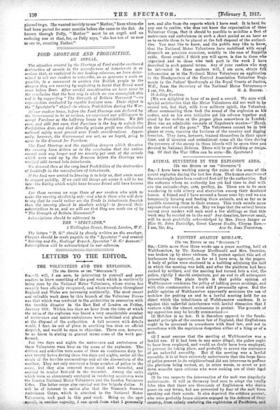A PROTEST AGAINST MOB-LAW.
[To THE EDITOR Or TEE " SPECTATOR.") Sian— Little more than three weeks ago a peace meeting, held at Waltbamstow, by Mr. Ramsay MacDonald and Mrs. Snowden, was broken up by sheer violence. No protest against this act of lawlessness has appeared, as far as I have seen, in the papers. A body of police were stationed in a building adjoining the hall in which the meeting was held, and after the platform had been rushed by soldiers, and the meeting had turned into a riot, the police, rightly I should conjecture, put an end to all subsequent proceedings. The plain truth is that public opinion at Walthamstow condemns the policy of holding peace meetings, and with this condemnation I must add I personally agree. But the public opinion of Walthamstow apparently sanctions the use of mob-law for putting an end to a lawful meeting held for an object which the inhabitants of Walthamstow condemn. It is against this unlawful interference with- lawful discussion that .I venture with the utmost seriousness to protest. The grounds of my opposition may be briefly summarized:—
(1) Mob-law is no law. It is therefore opposed to the funda- mental principle of the common law of England, that Englishmen ought to be governed in accordance with fixed law, and not in accordance with the capricious despotism either of a Ring or of a mob.
(2) I must assume that the meeting at Walthamstow was a lawful one. If it had been in any sense illegal, the police ought to have been employed, and would no doubt have been employed, to prevent its taking place, and probably to arrest the congeners of an unlawful assembly. But if the meeting was a lawful assembly, it is at least extremely unfortunate that the large force of police present in. its neighbourhood did not intervene to prevent the platform being rushed, or, in other words, to avert or put down assaults upon citizens who were- making use- of their legal rights.
(3) In two respects the intervention of the mob was singularly unfortunate. It will in Germany lead men to adopt the totally false idea that there are thousands of Englishmen who desire peace on any terms, but are prevented by fear of the mob front spanking out their .minds. It also deprived the soldiers preeent, who were probably brave citizens engaged in the defence of their country, from calmly confuting the sophistries of Pacificists, and thus convincing any Englishman who needed conversion that the argumente in favour of a patched-up peace were utterly worthless. I think the men in khaki do not as yet adequately realize how Ready are the English public to give attention to their words. (4) Mob-Taw in countries as humane as England has led to cruelties which can hardly be described by any milder term than the torture of its victims. Let me add that I am no opponent of law's, however stringent, necessary for the successful carrying on of the war. I am no Pacifieist. In the England of to-day the policy of Pacificism originates, in my judgment, in ignorance, folly, or fanaticism. My protest means this, and this only, that I condemn
and hate the rule of the mob.—I am, Sir, &c., A. V. Dicer.
Pire rejoice in Professor Dicey's protest, and endorse and adopt it in every particular. It was only because of the difficulty of keeping pace with the news that we failed to protest before. What the people of Walthanistow would probably reply to Professor : Dicey and the Spectator is that if they had not stopped the meeting their town would now be under the disgrace of being described as the place where an anti-war and surrender meeting can be held without any one desiring to make a protest.' The next step would be to declare that all the people of Walthainstow were Pacificists, &c. Our answer would be that persons present at such meet- ings should insist on the other side being heard. That is a much better way of dealing with the Pacifitista than storming the platform. The Anti-Pacificiste in the country are probably a thousand to one. That is too big a majority to tastily even the mildest appeal to physical force. A mastiff cannot fight with a pug. —En. Spectator.]







































 Previous page
Previous page